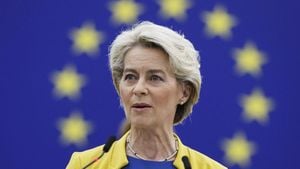President Joe Biden embarked on his inaugural trip to Africa, marking it with significant stops, including one at Angola's National Museum of Slavery. This visit was not just ceremonial but rooted deeply in acknowledging historical ties and enhancing the partnership between the United States and Angola. With such events, Biden aimed to reaffirm the commitment of the U.S. to address both the legacies of slavery and the future partnerships with African nations.
Biden's remarks were delivered on December 3rd, 2024, shortly after holding discussions with Angolan President, João Lourenço. This meeting signifies Biden’s promise to build stronger diplomatic and economic relationships with African nations, countering China's growing influence on the continent. "Together, the United States and Angola acknowledge the past horrors of slavery and its legacy, whilst looking forward to a bright future of continually deepening collaboration between our nations," the White House conveyed, highlighting the dual focus of the visit.
This trip had initially been slated for mid-October but had to be postponed due to severe weather following hurricanes Helene and Milton. Nevertheless, the timing of Biden's visit couldn’t be more poignant as it aligns with the increasing scrutiny on the historical impacts of slavery globally and the need for reparative justice.
The National Museum of Slavery holds deep significance, serving as both a historical reference and a solemn reminder of Angola’s tumultuous past intertwined with transatlantic trade of enslaved Africans. Biden's decision to speak here indicates his intention to blend recognition of historical injustices with active dialogue about future partnerships.
Angola's strategic position on the west coast of Africa makes it particularly important to the U.S. as both countries seek to strengthen economic ties, especially around energy resources and investment opportunities. During discussions, Biden also emphasized new initiatives including the U.S.-backed railway project, known as the Lobito Corridor, which will facilitate mineral exports and improve infrastructure
These projects exemplify the broader strategy Biden hopes to implement, which concerns bolstering economic cooperation and stability across Africa. The Lobito Corridor is expected to play a significant role in African economic growth by linking coastlines and enhancing trade routes, providing the U.S. with opportunities to invest significantly.
The visit also aligns with Biden's broader policy objectives of enhancing U.S. engagement with Africa as part of his administration's foreign policy. It showcases America’s readiness to work collaboratively with African nations on various issues ranging from security to climate change adaptation. Political analysts suggest this visit may serve as the groundwork for future collaborations aimed at addressing regional challenges, including youth unemployment and democratic governance.
While the symbolism of the trip, particularly the focus on slavery, resonates deeply within the African and diaspora communities, it also aims to send strong messages of support to Angolan Civil Society. Angola, which has recently been moving through economic reforms and democratic transitions, stands to gain from the enhanced attention and support from the U.S.
Biden’s stop at Angola reinforces the narrative of moving past historical grievances to create pathways for future growth and cooperation. This engagement reasserts the United States' commitment not only to moral rectitude but also pragmatic diplomacy where the legacies of the past inform the partnership of the future.
For President Biden, this trip marks both a hope-filled venture and a necessary chapter for redefining U.S.-Africa relations. The present dynamics showcase the balance of historical acknowledgment against economic collaboration, aiming for not just rhetoric but tangible change and support.
During another phase of the visit, which drew the eyes of press sections and analysts alike, Biden expressed support for democracy and good governance, demarcated as the U.S. policy stance toward African nations. His comments came amid broader discussions surrounding the potential for increased support for democratic institutions and free elections throughout the continent, with Angola as the focal point.
This visit could serve as a pivotal moment for Biden, presenting him the chance to take strides toward improving international relations at a time when challenges at home—such as political divisions and perception issues—pose significant hurdles.
With the reflections of Angola’s past echoed through the museum’s walls, Biden’s remarks accentuated the intertwining of history and future promises. U.N. representatives, alongside local civil society groups, greeted this renewed engagement as perhaps long overdue but fundamentally necessary for crafting new-age diplomacy with African nations.
Beyond politics, the visit may very well encapsulate the genuine emotional and symbolic weight carried by historical sites of such magnitude, presenting opportunities for reconciliation both socially and politically.
The U.S.-Angola partnership speaks volumes about international efforts directed at addressing the ramifications of colonialism and slavery whilst proactively working toward economic empowerment and collaboration.
While Biden aims to solidify his administration's stance on global democratic support during this visit, there remains anticipation over how these diplomatic advancements will materialize long term. Will this spur additional, broader socio-political collaborations or simply reflect rhetorical commitments without concrete follow-through? The world watches closely.
Overall, Biden's visit to Angola is not just about the destination but what it symbolizes: the willingness of the United States to acknowledge past wrongs and open up various avenues for genuine partnerships with African nations, all the time guided by shared humanity and mutual respect.



